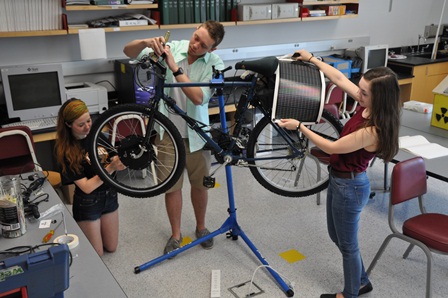SU Physics Students Designing Solar E-Bike
 |
| From left: Katie Murphy, Sam Brown and May Palace work on their solar-powered e-bike as part of SU's Bridges for SUCCESS program. |
Seniors Sam Brown of Annapolis and Katie Murphy of Bel Air, MD; and junior May Palace of Kent Island, MD, received $1,000 in National Science Foundation (NSF) funding to construct a solar-powered e-bike. The project is part of SU’s NSF-funded Bridges for SUCCESS (SU Connections to Careers for Every STEM (science, technology, engineering and mathematics) Student) program.
Dr. Joe Howard, SU professor of physics, serves as the group’s faculty mentor.
Though motorized bicycles date back to the 19th century, the SU team is putting a decidedly 21st-century twist on its bike, adding solar panels as the energy source.
“That way, it’s completely clean, independent energy,” said Brown.
According to Palace, the project fits well with SU’s “green” philosophies: “Salisbury is a school that is really interested in clean energy and sustainability. We thought a solar bike would complement those interests, as well as our own.”
Princeton Review, the U.S. Green Building Council and others have lauded SU for its sustainability efforts, which include everything from LEED-certified construction projects to the installation of the Eastern Shore’s first public electric vehicle charging stations.
Its cycling-related initiatives have included the dedication of a bike lane connecting SU with downtown Salisbury, construction of bike storage areas at residence halls, the addition of do-it-yourself bicycle repair stations around campus, an increase in bike racks at most University-owned properties and a recent independent student study of bicycle use on campus.
The e-bike team would like to take that dedication one step further.
“We want to reduce the carbon footprint while maintaining the convenience of travel people are used to,” said Murphy, noting that a solar-powered e-bike would combine the environmental friendliness of a bicycle with the flexibility of regular automobile travel.
Brown added that the ease of use would trump even that of an electric car since users would not need to rely on charging stations or electrical outlets to power the vehicle. And if all else failed … they could pedal.
The group hopes to complete construction of the bike by mid-July, at which time it will run tests and calculations to determine carbon footprint reduction and total energy savings — in terms of both power supply and human exertion. They present their findings to the Physics Department in early August.
After that presentation, the department plans to keep the bike as a demonstration tool. Brown, however, sees the potential for more: “Who knows? Maybe this could be the basis for a business.”
For more information call 410-543-6030 or visit the SU website at www.salisbury.edu.
